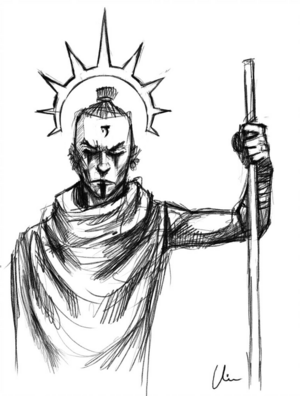Rholosh the Sage: Difference between revisions
mNo edit summary |
mNo edit summary |
||
| Line 37: | Line 37: | ||
After his death his followers consolidated his lands under the leadership of the nascent [[Triune Temple]] and a century later obeyed his command and began an [[Great Exodus of Thyss|exodus]] to a planet [[Rholosh|named eponymously]]. | After his death his followers consolidated his lands under the leadership of the nascent [[Triune Temple]] and a century later obeyed his command and began an [[Great Exodus of Thyss|exodus]] to a planet [[Rholosh|named eponymously]]. | ||
Rholoshi doctrines are based upon beliefs that other [[Races in the Núlne Galaxy|races]] may find to be morally dubious or outright evil, such as the ennoblement of deceit, conspiracy, murder, assassination, treason, and | Rholoshi doctrines are based upon beliefs that other [[Races in the Núlne Galaxy|races]] may find to be morally dubious or outright evil, such as the ennoblement of deceit, conspiracy, murder, assassination, treason, and overthrowal of authority. Change is considered to be the core elements of Rholoshi belief, with Rholosh credited for saving the Thyssian race from stagnation and the rule of greedy and decadent traditionalist Ashkhals. | ||
==Etymology== | ==Etymology== | ||
Revision as of 22:36, 9 May 2019
Rholosh | |
|---|---|
 A sketch of the earliest drawing of Rholosh, the Rholosh ar-Rhaža from the Khor Zukhun Shrine | |
| Born | Turhakh şe Theji ceş Yakhun -602 PA |
| Died | -482 PA |
| Cause of death | Murder |
| Resting place | Perennial Temple, Rholosh |
Notable work | Twenty-Seven Lessons of Rholosh |
Rholosh (c. -602 PA – c. -482 PA, born Turhakh şe Theji ceş Yakhun), also referred to as Rholosh the Sage and Saint Rholosh, was a x-century Thyssian preacher, philosopher and religious leader. He is the central figure of the Triune Temple, and is widely accepted as the most influential person in Thyssian history. Rholosh united some of Thyss into a single polity, with his Twenty-Seven Lessons as well as his teachings and practices forming the basis of Triunal belief.
Born approximately -602 PA (Thyssian calendar: x y) in the village of Thava, Rholosh was orphaned at the age of ten with the destruction of Thava in unclear circumstances. His whereabouts and activities for the next 88 years are relatively unknown. In -504 PA he began preaching in Rheng and by -501 PA had sanctioned the creation of the first temple. Between -501 and -496 PA Rholosh debated with numerous Ashkhals, traditionalist priest-kings, on the validity of traditional teachings and the moratorium on travel into the Great Void.
The followers of Rholosh were initially few in number, and experienced great hostility from the traditionalists. In -496 he and his followers were forced to flee Rheng across the Karhan Bluffs, where he took refuge in the lands of the Ashkhal Vakhuž. Vakhuž was receptive to his teachings and his realm soon converted. By -493 the Ashkhal and his family disappear from the records and Rholosh assumed control over his realm. By -482 Rholosh and his followers had conquered and subjugated vast swathes of lands and he had established a network of alliances with convert Ashkhals.
In -482, a month after commanding his followers to begin preparations to abandon Thyss, Rholosh was murdered by a figure identified only as din Khana (Son of the Blade). It is believed by his followers that Rholosh knew of his impending death and gave instructions for his killer not to be harmed, though his will in this matter was not carried out. He was initially buried in the Shrine at Khor Zukhun.
After his death his followers consolidated his lands under the leadership of the nascent Triune Temple and a century later obeyed his command and began an exodus to a planet named eponymously.
Rholoshi doctrines are based upon beliefs that other races may find to be morally dubious or outright evil, such as the ennoblement of deceit, conspiracy, murder, assassination, treason, and overthrowal of authority. Change is considered to be the core elements of Rholoshi belief, with Rholosh credited for saving the Thyssian race from stagnation and the rule of greedy and decadent traditionalist Ashkhals.